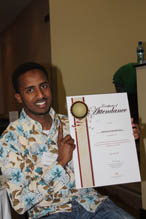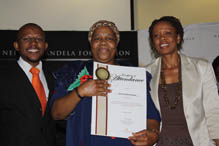
Community Conversation Implementing Partner Bea Abrahams
September 15, 2010 – The media’s portrayal of xenophobic attacks was one of the controversial issues discussed, together with questions around the role and the rule of law and justice, on the second day of the “Dialogue for Social Change” seminar, hosted by the Nelson Mandela Foundation at the Protea Hotel Parktonian.
During a session entitled “Truth-Seeking, Migration and Social Justice”, issues of the rule of law in the context of migration and human rights were discussed by the panellists and audience.
Joyce Tlou, of the South African Human Rights Commission (SAHRC), gave a presentation on the rule of law, justice and impunity of investigation, explaining how these three factors fit together in the case of the xenophobic violence of 2008.
She spoke of how the SAHRC had gathered background information from stakeholders in those communities where xenophobic tensions had been at their worst, to establish how justice and the rule of law were functioning. Their study found that there was little institutional memory of similar social conflicts and that, as a result, government departments were unable to respond to the violence appropriately.
She noted how poor relationships between the residents and key officials, a lack of faith in the police, and limited administrative justice, had contributed to the poor response, also noting how ineffective anti-xenophobic campaigns had been in encouraging behaviour change.
Since 2008, however, the government has put measures and mechanisms in place, so as to respond more effectively to these types of issues in the future. Tlou congratulated the Gauteng province and the Western Cape for developing exit strategies and social conflict plans that give a long-term perspective to the problems. She closed by emphasising the importance of a strategy to address the root causes of the problems as the only way to prevent an outbreak of a similar kind in the future.
She was followed by Verne Harris, head of the Foundation’s Memory Programme, who spoke of truth, memory and justice in the context of social cohesion and the community conversations.
Harris pointed to the fact that, in South Africa, there is still significant scepticism about the justice system and the rule of law, one that ultimately stems from a distrust of apartheid-era justice and legal systems. This distrust means that communities have instead relied upon memory as a means to establish truth.
Memory as a tool for seeking out truth and working through national and personal histories is useful in transitional democracies, as finds evidence in South Africa, through the Truth and Reconciliation Commission, Harris argued. But memory is inherently flawed and fluid, meaning it can subvert truth-seeking, reconciliation-building exercises.
Harris posited that dialogue can bridge the gap between evidence-based thinking, on which justice systems are based, and the ways in which communities remember. By bringing together both experts and community members through dialogue, a new kind of truth, an authenticity – memory informed by evidence – can emerge.
Harris concluded by speaking of the importance of this kind of dialogue in the Foundation’s work: “In the past two years, the community conversations run by the Foundation sought to contribute to truth recovery and sought to bring experts into dialogue with non-experts and embrace the notion of humans as dialogical.”
Following Harris, Paul Graham from the Institute for Democracy in South Africa, spoke about knowledge. He explained that knowledge is contingent on what an individual accepts or believes, and that knowledge helps us act in the world and is a reflection and analysis of experience.
He touched on how, when research is conducted into some of the complex issues with which South Africa grapples, there is little feedback given to the community, meaning that there is little they can do to change. Sharing knowledge leads to a better society, he argued.
He said: “In truly democratic communities, we learn that, when we share knowledge and individuals prosper, our experience as a society expands for the better.”
In a shift from the role of justice to the role of the media, Deputy Minister of the South African Police Force Fikile Mbalula then made the case for responsible reporting as a means to support and advance democracy, arguing that self-regulation isn’t always sufficient, and that additional measures might be needed to protect citizens.
In response, William Bird, director of Media Monitoring Africa, focused on the challenges of portraying xenophobia, asking what role the media plays in challenging or perpetuating xenophobia.
What he has found in his research, Bird explained, was that mass media had taken a clear and unbiased position in condemning racism and xenophobia, “in line with our Constitution”.
He said that the media has changed a lot since 1994 and that there has been a positive shift since the advent of democracy. Like any other institution, it has its ups and downs, but, Bird argued, the media has on the whole been committed to preventing xenophobia by creating public awareness on the issue.
“The Independent Group publishes an insert called The Migrant, which is targeted at migrant nationals in South Africa. There is also a supplement from Avusa Media which [targets] children,” he said.
He then encouraged people to build on the positive energy and play a more active role in social cohesion dialogues such as the ones introduced by the Foundation.
Mondli Makhanya, chairperson of the South African National Editors’ Forum, noted that people are naturally sceptical of “the other” and that this was seen on a local and national level. When migration first started, the media didn’t fully reflect on the trend and how they were contributing to the portrayal of migrants: “In 2008, when the xenophobic violence broke out, we started pointing fingers at the government, asking ourselves what could have led to that violence. We as the media had taken our eyes off [the issue], because we were busy pursuing political stories at the time and took our eyes off what was happening on the ground.”
He argued, however, that the media now needs to help inform South Africans about the importance and role of migrants in advancing our democracy.
Following the seminar, all of the community conversation facilitators were acknowledged for their role in the process and for completing the CCE programme, and were given certificates by the Foundation.
Sello Hatang, information communications officer for the Nelson Mandela Foundation, said: “It is an honour to thank you. Your efforts have not gone unnoticed in our office, the country and the continent, and we hope you will continue your good work. “
Head of the Dialogue Programme at the Foundation, Mothomang Diaho, said in closing: “It has been a great two days for all of us, and this is a celebration and to honour the work you have done in our communities across the country.”



